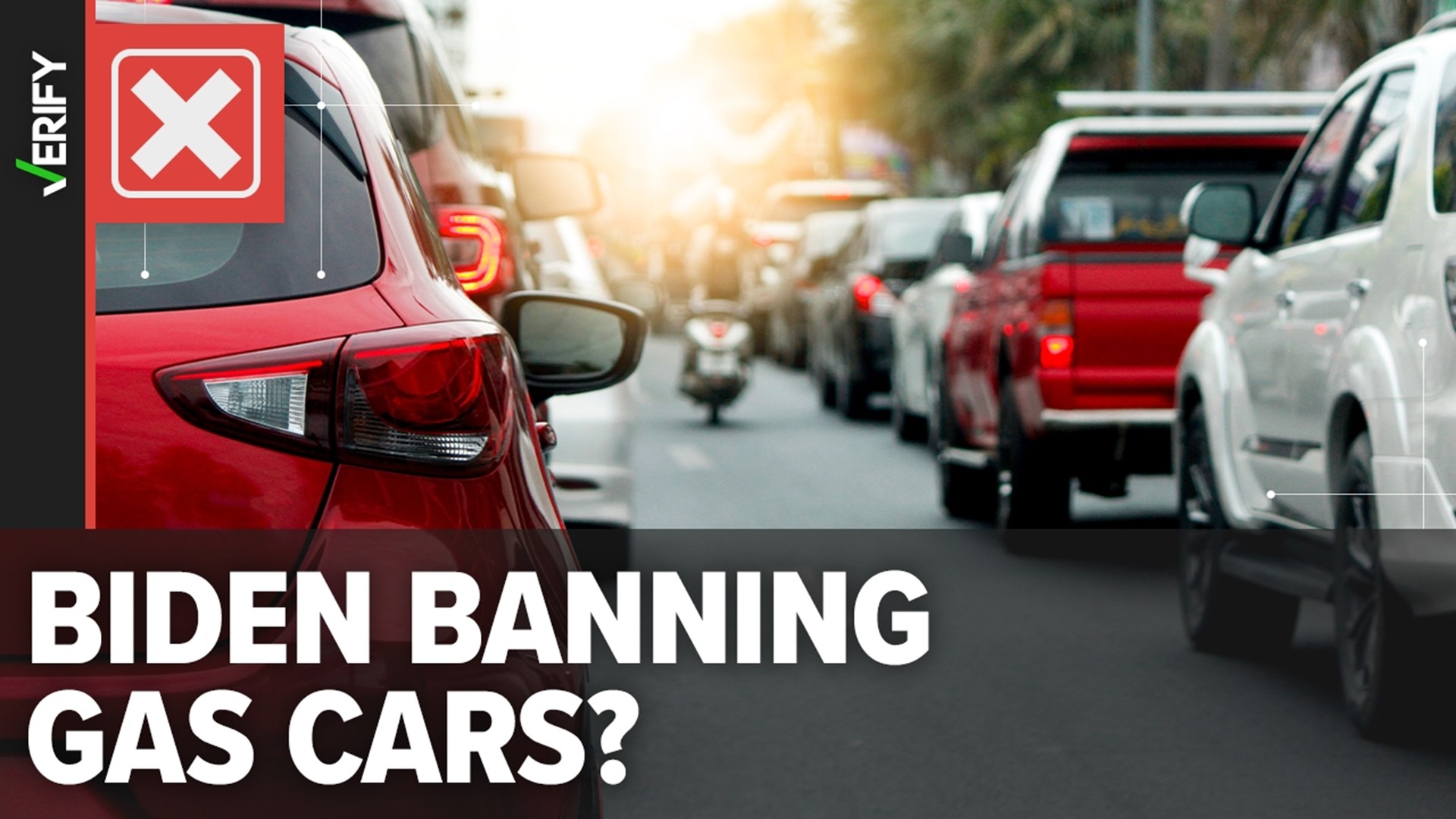UPDATE (03/20/2024): The Biden administration announced new emissions standards for cars and trucks on March 20. The new rule slows implementation of the stricter pollution standards initially proposed by the EPA, but eventually ramps up to nearly reach the agency's preferred standards by 2032. The story continues as originally published below:
-------------------------------------------
In February, ads airing in multiple states claimed President Joe Biden’s Environmental Protection Agency is “rushing” to ban new gas-powered cars in the United States in order to force people to buy electric vehicles. The American Fuel & Petrochemical Manufacturers (AFPM), a trade association representing fuel manufacturers, paid for the ads.
The AFPM said on Feb. 12 that the ads were launched to inform people in Pennsylvania, Wisconsin, Michigan, Nevada, Arizona, Ohio, Montana and the Washington, D.C. area about the Biden administration’s alleged efforts to ban new gas, diesel, traditional hybrid and flex-fuel vehicles from the U.S. market.
Several VERIFY readers who saw the ads, including Deb and Rachel, asked if the Biden administration is really trying to ban gas-powered vehicles in the U.S.
THE QUESTION
Is the Biden administration banning gas-powered vehicles in the U.S.?
THE SOURCES
- Environmental Protection Agency
- The White House
- Office of Management and Budget
- RMI, an independent, non-partisan, nonprofit that transforms global energy systems
THE ANSWER
No, the Biden administration is not banning gas-powered vehicles in the U.S. The EPA has proposed strict automobile pollution limits that would require up to two-thirds of new passenger cars and trucks sold in the U.S. to be electric by 2032.
WHAT WE FOUND
The Biden administration is not banning gas-powered vehicles in the U.S. Instead, the EPA has proposed strict automobile pollution limits that would require up to two-thirds of new passenger cars and trucks sold in the U.S. to be electric by 2032. These standards, which the agency says are vital to slowing climate change, will only apply to new cars manufactured in model year 2027 and beyond, not ones currently on the roads.
On April 12, 2023, the EPA proposed new federal vehicle emissions standards for light-duty, medium-duty and heavy-duty vehicles manufactured for the 2027 through 2032 model years to “significantly reduce climate and other harmful air pollution.” The proposed standards would set the strictest tailpipe pollution limits the EPA has imposed in more than 40 years and call for far more new EV sales than the auto industry agreed to in 2021.
However, the EPA is not banning gas-powered vehicles. The proposed standards do not mandate or “target” the use of a specific technology, such as EVs, and it would not require automakers to boost electric vehicle sales directly. Instead, it sets emissions limits and allows automakers to choose how to meet them.
According to an October 2023 article published by RMI, the EPA rule does not outlaw diesel and petrol (gas) vehicle sales. RMI is an independent, non-partisan, nonprofit focused on accelerating the transition to a clean energy future. Car manufacturers must meet average emissions limits across their entire product line, and RMI says the sale of gas-powered vehicles will not stop in 2027.
The EPA’s proposal is currently in an interagency review process. A final ruling is expected to come sometime this spring.
Under the proposed standards, RMI says that automakers must document that their new product line does not exceed the average tailpipe emission limit. Automakers will also have a series of options to ensure their new vehicles meet the EPA requirements starting in 2027. These options include implementing particulate filters to reduce particulate matter (PM) emissions and adopting other technology improvements to reduce the carbon dioxide (CO2) from gas and diesel-powered vehicles.
If automakers comply with the proposed standards, the EPA projects that at least 60 percent of new passenger vehicles sold in the U.S. would be electric by 2030 and up to 67% by 2032. For slightly larger, medium-duty trucks, the EPA projects that 46% of new vehicle sales will be EVs in 2032.
The RMI says that drivers will not be subject to emissions checks or mandates under the proposed standards. The regulations indirectly affect consumers when they purchase a new vehicle starting in 2027, “as it will likely impact the type of vehicle that is available for purchase.”
“This policy impacts the point of sale and does not require any action by the consumer. In fact, tailpipe emission regulations are already in place today, and the proposed rules simply increase the stringency for vehicles manufactured in model 2027 and beyond,” RMI said.
Thousands of auto dealers have said they won’t be able to meet the EPA’s stringent goals. In November, nearly 4,000 dealerships of the nearly 17,000 franchised shops nationwide sent a letter to President Joe Biden, asking him to “tap the brakes” on the EPA proposal, referring to the rules as an “electric vehicle mandate.” House Republicans approved a bill in December to block the pollution limits and also called the rules a mandate.
Auto dealers sent Biden a second letter in January asking him to “hit the brakes” entirely, citing several factors that they say indicate slowing EV adoption. The signers said the supply of EVs on dealer lots is twice that of internal combustion engine vehicles, and that they won’t be able to sell EVs at the rate the regulations would require.
But sources familiar with the plan told the New York Times in February that the Biden administration intends to give car manufacturers more time to adopt the EPA’s requirements in an election-year concession to automakers and labor unions.
The Associated Press contributed to this report.

